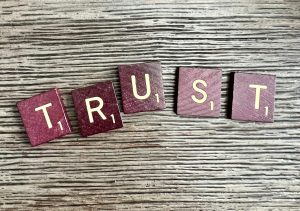11 Chapter 11 – Trust
Trust building
Soft skills are attributes that enhance and direct how you communicate and interact with others. Trust building aligns with this definition because it significantly impacts how effectively individuals communicate and collaborate. It fosters open and honest interactions and ensures that individuals are willing to depend on each other and work towards shared goals. It helps in resolving conflicts and enables better coordination and cooperation among team members.
Trust is a dynamic process that unfolds over time through interactions and communication with others.
While the definition of trust as a willingness to be vulnerable based on the expectation that the trusted party will act favorably and predictably (Mayer et al., 1995) might suggest that trust is a static, one-time decision, trust is actually a dynamic process that unfolds over time through interactions and communication with others. When you think about trust as interaction and communication, it becomes clear that trust is not a one-time event but an ongoing relationship. Every interaction either strengthens or weakens trust, depending on how consistently each party meets the other’s expectations. Communication plays a critical role in this process—open, honest, and transparent communication helps to reinforce trust by confirming that both parties are aligned in their intentions and actions.
Trust is also influenced by how we respond to breaches or challenges. For instance, when misunderstandings or mistakes occur, the way these issues are communicated and resolved can either repair or even deepen trust. Trust is built incrementally, as each positive interaction adds to the foundation, making the relationship more resilient over time. So, rather than being static, trust is fluid and evolves as people continue to interact and communicate. It requires ongoing attention and maintenance, where each action and conversation contributes to the overall trust between parties.
Many people think when you enter the workplace demonstrating your competence consistently is the single most important factor in developing trust with your supervisor and colleagues. This is not correct; it involves much more than that.
Professional work is all about teamwork, and that naturally requires trust. Everyone on the team needs to trust that their colleagues are just as committed to the group’s goals and will do their part to help achieve them (Aubert & Kelsey, 2003). Your supervisor needs to trust that you can handle work that affects the organization. Your coworkers need to trust that when you say, “I’ll take care of that,” you’ll follow through. You need to trust your supervisors and coworkers to support you, provide help or information when you need it, and forgive you if mistakes happen.
New employees often feel frustrated when they’re not included in social events or given important projects right away. While this doesn’t always happen, it’s helpful to think about it in terms of trust. Trust isn’t built overnight; it develops over time as people interact and get to know each other’s strengths and reliability. For example, organizations tend to be cautious about assigning high-stakes tasks to new hires until they’re confident that those employees can handle them effectively. This careful approach helps manage risks and ensures that employees are ready for more critical roles. For new employees, this can be disappointing. They might see the work they’re given, or the lack of social invitations, as a sign that their potential isn’t fully recognized or that they are not valued. Both new hires and organizations need to work on building trust together. As employees demonstrate their abilities, organizations can gradually increase their responsibilities. Open communication and patience are key to making this transition smoother for everyone.
Framework to help think about it
One frequently cited model of trust, known for its surprising findings, is Mayer et al.’s (1995) Integrative Model of Organizational Trust. This model was drawn from research in psychology, social studies, and management, to create a universal model of how trust works. The model describes how people judge an individual’s trustworthiness according to three factors: Ability, Benevolence, and Integrity. Since the model was initially developed, further research has suggested the importance of consistency in demonstrating these factors is also important to trust building.
- Competence is your ability to reliably and successfully do what you say you will do to meet shared goals.
- Integrity is being accountable for what you say and do, and doing the right thing. It involves ensuring that your internal character is expressed consistently regardless of external conditions.
- Benevolence involves considering others’ needs and goals and striving to understand them. It is the disposition to go beyond personal interests to genuinely care about, and support, others.
Remember we asked you if competence was the most important factor in being trusted at work?
Many people believe that competence is the most crucial factor in earning trust, leading them to emphasize their knowledge and list past accomplishments when trying to establish credibility. However, while competence is important, it is not the most critical factor in building trust. The most important element is in fact benevolence—the genuine concern for others’ interests.
The most important element in building trust is benevolence—the genuine concern for others’ interests.
If people don’t believe you have their best interests at heart and lack integrity, no amount of competence will fully earn their trust. To truly build trust, you must demonstrate that you care about them and are genuinely interested in their goals, challenges, and needs.
For example, imagine you make a mistake on a project your co-worker was relying on. This error puts your competence into question. To regain trust, you should acknowledge the mistake, communicate how it has impacted your colleague, outline what you’ve learned so it won’t happen again, and suggest how you would plan to address the issue. While this process might be challenging, if your colleague sees that you are taking responsibility and being transparent, they are likely to give you a second chance.
Opportunity for action and change
Trust underpins how teams collaborate, how individuals interact, and how decisions are made. Trust influences not just the flow of communication within an organization but also your personal agency—your ability to make decisions and take meaningful actions. When trust is lacking, communication may become guarded or superficial, which can hinder your ability to assert agency and influence outcomes.
 Trust is closely linked to the fundamental human needs for autonomy, competence, and relatedness. When you trust your colleagues and supervisors, you feel more comfortable exercising autonomy, knowing that your actions will be supported and understood. Trust also reinforces your sense of competence, as it creates a safe environment where you can take risks, learn from mistakes, and grow. Additionally, trust fosters a sense of relatedness by strengthening the bonds between team members, making you feel more connected and valued within the organization. Trust is built from communication that expresses integrity, honesty, and a genuine concern for others. In this way it is inherently aspirational.
Trust is closely linked to the fundamental human needs for autonomy, competence, and relatedness. When you trust your colleagues and supervisors, you feel more comfortable exercising autonomy, knowing that your actions will be supported and understood. Trust also reinforces your sense of competence, as it creates a safe environment where you can take risks, learn from mistakes, and grow. Additionally, trust fosters a sense of relatedness by strengthening the bonds between team members, making you feel more connected and valued within the organization. Trust is built from communication that expresses integrity, honesty, and a genuine concern for others. In this way it is inherently aspirational.
The Mayer, Davis, & Schoorman model described above highlights that anyone, regardless of experience, can actively build trust. For newcomers, understanding that benevolence—caring about others’ needs—is just as important as ability. This is crucial in overcoming the hesitation to ask questions when starting a new job. Instead of just asking, “Can you show me this again?” try framing it with concern for others: “I want to ensure I do this correctly so it doesn’t cause issues later. Could you check my understanding to avoid any delays?” This approach shows you’re considerate of others, which helps build trust. Here are some other ways to do this:
Benevolence
- Understand the mission of the organization and your supervisor’s goals. Participate in activities like remote lunches, or learning sessions to further grasp objectives.
- Cultivate empathy by observing and asking questions to understand others’ perspectives. Listen actively to understand both the words and the underlying emotions and values.
- Address conflicts directly and calmly, focusing on mutually beneficial solutions rather than blame, avoidance, or gossip.
- Be present and attentive to your environment. Asking questions helps you understand the rationale behind actions and the needs of others. Show curiosity and avoid assumptions.
Integrity
- Uphold your commitments by meeting deadlines, anticipating potential delays and setting realistic expectations. Avoid over-promising and under-delivering. Keep your boss informed about your progress before they have to ask.
- Take responsibility for your actions, acknowledge mistakes, and be transparent about your role in any issues. Effective apologies involve acknowledging harm, recognizing the other person’s feelings, explaining preventive measures, and making sincere efforts to rectify the situation.
- Be careful about the words you choose. Ensure your face and words are engaged positively in meetings and when on video calls. Don’t dominate conversations, avoid gossiping, and don’t complain behind a colleague’s back.
Competence
- Be prepared for meetings and arrive early. Bring a notebook and take notes to ensure follow-through on tasks.
- Use clear, concise, and professional language in both written and verbal communications. This clarity reflects your understanding of issues and your competence in addressing them.
- Prioritize attention to detail in all tasks no matter how small. Consistent quality demonstrates your work ethic to colleagues and supervisors.
- Demonstrate a commitment to learning by asking insightful questions and regularly seeking feedback. This shows a growth mindset and a dedication to self-improvement.
- Keep up-to-date with industry trends, company news, and relevant skills, demonstrating your commitment to maintaining competence and staying relevant in your field.
By consciously practicing these skills and behaviors listed above, individuals can develop their competence in building and maintaining trust. This competence is valuable in all areas of life, including personal relationships, workplaces, and broader social interactions.
References
Aubert, B. A., & Kelsey, B. L. (2003). Further understanding of trust and performance in virtual teams. Group Research, 34(5), 575-618.
Baltes, B. B., Dickson, M. W., Sherman, M. P., & Bauer, C. C. (2002). Computer-mediated communication and groups decision making: A meta-analysis. Organizational Behavior and Human Decision Processes, 87(1), 156-179.
Mayer, R. C., Davis, J. H., Schoorman, D. F. (1995). An integrative model of organizational trust. Management Review, 20(3), 709-734.
Supplementary material
Frei, F. X., & Morriss, A. (2020, May-June). Begin with trust. Harvard Business Review. https://hbr.org/2020/05/begin-with-trust
